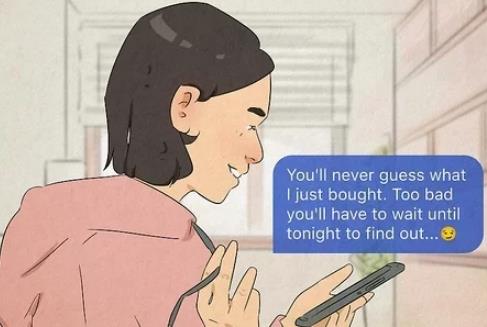How to Respond to Unwanted Gay Sexts
Receiving unwanted sexts can be unsettling or intrusive, particularly within the gay community where digital interactions can sometimes cross personal boundaries. Knowing how to handle these situations with assertiveness and tact is crucial. Here's a comprehensive guide on responding to unwanted gay sexting while maintaining your dignity and ensuring your digital safety.

Immediate Responses
When you first receive a sext that makes you uncomfortable, your response can set the tone for all future interactions with that person.
- Be Clear and Direct: State plainly that you are not interested in this kind of interaction. A simple, "I'm not interested in sexting, please don't send me messages like this," should convey your message without ambiguity.
- Ignore: In cases where you don't feel a response is warranted, or if ignoring is safer (for example, with strangers), simply not responding is also a viable option.
Setting Boundaries
If the person continues to send unwanted messages, it’s important to set firm boundaries.
- Reaffirm Your Boundaries: Be more assertive with a follow-up message, "I've mentioned before that I am not comfortable with these kinds of messages. Please respect my preferences."
- Block or Report: If the unwanted behavior persists, utilize the blocking and reporting features on messaging platforms to prevent further contact and alert the platform to potential abuse.
Protect Your Privacy
In dealing with unwanted sexts, protecting your personal information becomes even more crucial.
- Review Your Privacy Settings: Ensure that your privacy settings are secure on all social media and messaging platforms to prevent strangers from accessing your personal information.
- Be Cautious with Personal Data: Avoid sharing sensitive personal information with people you do not trust fully, as it can be misused in cases of unwanted sexting.
Legal Recourse
In certain extreme scenarios, legal action might be necessary, especially if the content becomes threatening or if the sender engages in harassment.
- Document Everything: Keep records of all unwanted communications. Screenshots and logs can be crucial if you decide to report the behavior to authorities or seek legal advice.
- Consult Legal Advice: If you feel threatened or harassed, consulting with legal professionals can provide you with options based on your local laws.
Seek Support
It's important not to face these situations alone. Support from friends, family, or professional counselors can be invaluable.
- Talk About It: Discussing your experience with trusted individuals can provide emotional support and practical advice.
- Professional Help: If unwanted sexts are causing significant stress or anxiety, consider seeking help from a professional counselor or therapist.
Education and Awareness
Educating yourself and others about the etiquette and legal aspects of sexting can foster a more respectful environment online.
- Promote Respectful Interactions: Lead by example and encourage respectful digital communication within your community.
- Stay Informed: Keep up to date with the latest in online safety and privacy practices to protect yourself and others from similar situations.
Handling unwanted gay sexting can be challenging, but by taking decisive actions and maintaining clear communication, you can safeguard your privacy and emotional well-being. Remember, you have the right to control your digital interactions and to disconnect from those that make you uncomfortable.